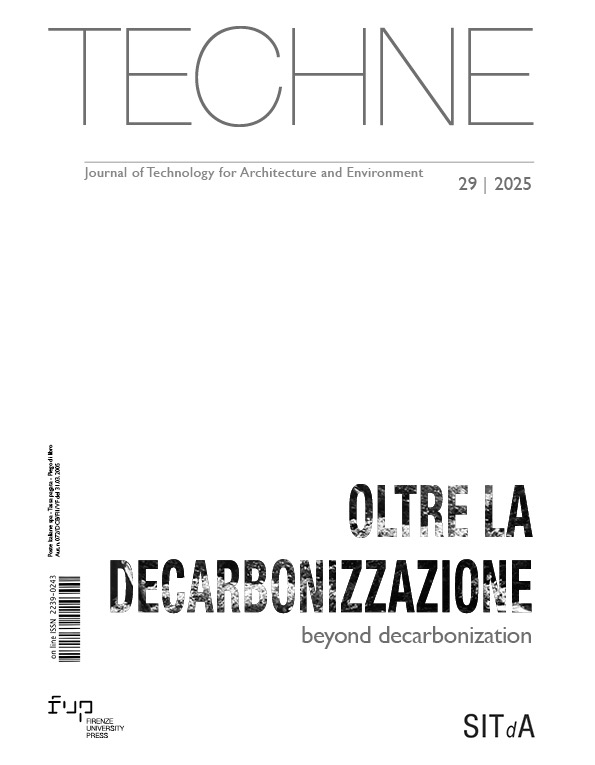Published 2025-07-31
Keywords
- energy-sufficiency,
- decarbonisation,
- vertical farm,
- collective housing,
- energy/food production
How to Cite
Copyright (c) 2025 Paolo Cascone, Maddalena Laddaga, Filippo Orsini

This work is licensed under a Creative Commons Attribution 4.0 International License.
Abstract
Due to the consequences of climate change and the Ukrainian conflict, nearly 42 million people across Europe could not afford to heat their homes properly in 2022. Beyond the political debate on the energy price cap, as recently suggested in the European Green Deal project, refurbished and new sustainable buildings in the EU will need to pave the way for a clean and affordable energy system. The paper will focus on a scientific design methodology based on a comparative analysis of case studies in the field of self-sufficiency, energy and food production in collective housing. The theoretical frame is based on a diachronic vision of relations between energy, food, architecture, and its production chains as drivers for innovative and integrated design processes. This also aims to develop alternative economic models where communities could become more accountable, share resources, and self-produce their energy and food, shifting their role from consumers to producers.
Downloads
References
- ASA, Advanced School of Architecture (2022), Booklet ASA Masterclass P. Cascone, Director Pierre-Alain Croset. Students: Carlos David Arcos Jácome, Shiryu Kawamura, Alina Kim Simon Johan Muller, Alessia Sassone, Ummi Fathima Zakir Hussain, Avide Francesco Avesani, Denis Kapitanov, Zirong Song Milena Sharkova, Mona Nheili, Marco Stringhetti, Ara Ibrahim, Alice Miloni, Nehir Özdemir Selin Yavuz, Andrea Di Tommaso, Gabriele Licciardi, Noora Khaled Ali Ebrahim Husain Alhashimi, Emily Marie Shiga. Uow Students: Agathe Alexandre, Mette Pedersen, Edoardo Ripamonti, Rofayda Salem. Available at: https://www.auic.polimi.it/fileadmin/user_upload/auic/scuola/asa/2-edizione/BOOKLET_1st_ASA_aa_2022-2023.pdf (Accessed on 04/11/2024).
- Barthel, S. and Isendahl, C. (2013), “Urban gardens, agriculture, and water management: Sources of resilience for long-term food security in cities”, Ecological Economics n.86.pp 224-234. Available at: https://doi.org/10.1016/j.ecolecon.2012.06.018. DOI: https://doi.org/10.1016/j.ecolecon.2012.06.018
- Calder, B. (2022), Architecture: From Prehistory to Climate Emergency, Penguin Books, London.
- Calder, B. (2022), “Form follows fuel”, The architectural review n°1495, pp. 6-12.
- Despommier D. (2019), “Vertical farms, building a viable indoor farming model for cities”, The journal of field actions, Special Issue 20, pp. 68-73. Available at: https://journals.openedition.org/factsreports/5737 (Accessed on 06/02/2025).
- Dunster, B. (2018) Zedlife: How to Build a Low-Carbon Society Today. RIBA publishing, London. DOI: https://doi.org/10.4324/9780429345715
- Dunster, B., Simmons, C. and Gilbert, B. (2008) The ZEDbook: solutions for a shrinking world. Taylor & Francis, Abingdon.
- Dunster, B. (2010) “The ZEDfactory” in Mostafavi, M. and Doherty, G. (Eds), Ecological Urbanism Harvard University, Graduate School of Design, Lars Müller Publishers, Baden, Switzerland, pp. 274-279.
- European Commission (2020), A Renovation Wave for Europe – greening our buildings, creating jobs, improving lives. Available at: https://eur-lex.europa.eu/legal-content/EN/TXT/?qid=1603122220757&uri=CELEX:52020DC0662. (Accessed on 07/10/2024).
- EESC (2023), Tackling energy poverty for a just transition. Available at: https://www.eesc.europa.eu/en/agenda/our-events/events/tackling-energy-poverty-just-transition (Accessed on 07/10/2024).
- Koolhaas, R. and Obrist, H.U. (2011), Project Japan: Metabolism talks. Edited by K. Ota and J. Westcott. Köln Taschen.
- Mancebo, F. (2018), “Gardening the city: addressing sustainability and adapting to global warming through urban agriculture”, Environments, Vol. 5, n. 3. Available at: https://doi.org/10.3390/environments5030038. DOI: https://doi.org/10.3390/environments5030038
- Orsini F. (2022) “Food Vertigo. Processes and devices for metropolitan food resilience”, TECHNE, Vol. 23. Available at: https://doi.org/10.36253/techne-12139. DOI: https://doi.org/10.36253/techne-12139
- Orsini F. and others, (2023) “Metropolitan Farms: Long Term Agri-Food Systems for Sustainable Urban Landscape”, in Technological Imagination in the Green and Digital Transition, The Urban Book Series, Springer Publ. Available at: https://doi.org/10.1007/978-3-031-29515-7. DOI: https://doi.org/10.1007/978-3-031-29515-7
- Pulighe, G. and Lupia, F. (2019), “Multitemporal Geospatial Evaluation of Urban Agriculture and (Non)-Sustainable Food Self-Provisioning in Milan, Italy”, Sustainability, Vol. 11, n. 7. Available at: https://doi.org/10.3390/su11071846. DOI: https://doi.org/10.3390/su11071846
- Salleh, A. M., Harun, N. Z., & Halim, S. A. (2020), “Urban Agriculture as a Community Resilience Strategy against Urban Food Insecurity”, Environment-Behaviour Proceedings Journal, Vol. 5, n. 13. Available at: https://doi.org/10.21834/e-bpj.v5i13.2047. DOI: https://doi.org/10.21834/e-bpj.v5i13.2047
- Webb, S. and Downie, P. (2023) “Revisit BedZED”, The architectural review n°1500, pp. 108-117.






